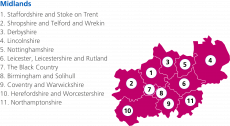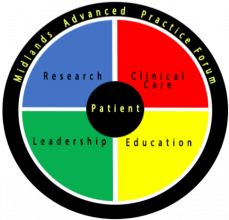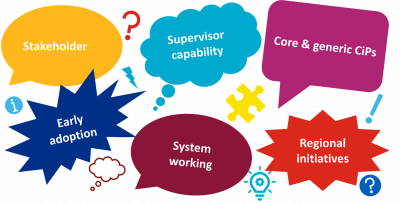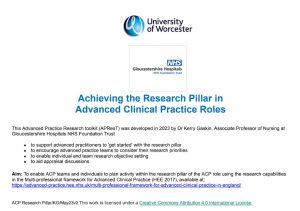Trainee Places for 2025 / 2026

The Multi-professional Education and Training Investment Plan (METIP) process for requesting numbers of advanced practice trainee places in 25/26 will be completed at the ICS level.
Each ICS has a designated METIP lead to complete the submission. The Midlands Faculty and Commissioning team will soon be in contact with advanced practice leads in provider organisations and training hubs to enable their effective onward engagement in this process.
Midlands Advanced Practice Forum – On the road: Worcester Roadshow

The Midlands Advanced Practice Forum is an independent multi-professional group. They promote a platform, for advanced practice networking and peer support. Alongside, shared learning across specialities in the NHS Midlands region.
This month the Forum have their in-person event. This is taking place on Wednesday 24th April 2024,12:45pm – 5:15pm, at the Cotswold A Suite, University of Worcester.
This event is free to attend. You can register via the Save the Date email if you are already a forum member. If you are not already a member, email Hirminder Ubhi at Hirminder.ubhi@nhs.net. The Forum look forward to welcoming you.
The Forum plans to launch its website at the Worcester meeting, this will have a live membership database. Watch this space!
Your membership subscription will give you access to a wide range of skilled experienced advanced practitioners/ trainee advanced practitioners across the Midlands. Keep your eye out for more news to follow, via our Forum emails.
As a forum we aim to host two virtual events and two in person events each year. If you are not on our mailing list yet, please get in touch with our Chair Mary Hutchinson – mary.hutchinson4@nhs.net or Co-chair Hirminder Ubhi – Hirminder.ubhi@nhs.net
Demystifying Workforce Planning
The Midlands Faculty for Advancing Practice will be looking into ways in which colleagues across the region can come to learn more about workforce planning. If you’d like to stay up to date with any developments and be the first to hear about any events, sign up to our mailing list.
In the meantime, if you have any questions, please contact us at england.apfac.midlands@nhs.net
Results Available from the National Education and Training Survey (NETs)

The annual NETS survey is carried out by NHS England. It is the only multiprofessional National survey open to all advanced practitioner trainees. Therefore it is so important that we have a good response rate. This enables us to improve the clinical learning environment for all trainees. This year we saw an incredible 250% improvement in the response rate from advanced practice trainees in the Midlands! This was thanks to the 1194 Midlands Advanced Practice Trainees who took time out of their busy roles to complete the survey. Alongside, Advanced Practice Leads and Course Programme Leads who sent out the reminders. This will enable the organisation to take action to improve advanced practice trainees experience.
The results from our annual NETS survey are anonymised and publicly available here showing a response rate of 26% from our Midlands Advanced Practitioners. Feedback falls under categories such as induction, supervision, overall learning experience, etc. Responses for each category are compared to the National average scores for that benchmark group ie ‘Advanced Practice’. You can filter results by ICS, trust or site level data.
NHS England can work with provider organisations to share best practice as well as identify areas in which the clinical learning environment may not be meeting quality standards. The Midlands region had advanced practice trainee results from across 27 different organisations. Most of these results were within the national average. The “team working” category scored above the national organisation in several organisations.
If you have any queries about the NETS survey, then please contact the quality team at england.nets@nhs.net or the Faculty for Advancing Practice Midlands at england.apfac.midlands@nhs.net
Midlands Faculty for Advancing Practice Training Programme Directors (TPDs)
The Training Programme Directors (TPDs) at the Midlands Faculty are available to respond to any queries you may have with regards to specific areas. TPD’s work with the Faculty one day per week and access their emails during that time. They are keen to offer advice and information on education and training needs. Our TPD’s also link with the Midland’s Integrated Care Systems (ICSs).
Two of our TPD’s have left their roles. Jane Elwell, TPD for Urgent and Emergency Care, and Gemma Ford, TPD for Mental Health. We wish them well in their future endeavours. The Faculty will be able to reply to queries in the absence of TPDs.
Please contact:
Liz Bennett Hayes (Midwifery) e.bennetthayes@nhs.net (Shropshire, Telford and Wrekin)
Andy Cole (Rehabilitation) andy.cole4@nhs.net (Derbyshire / Leicester, Leicestershire and Rutland)
Jenny Riley (Acute Care) jennifer.riley8@nhs.net (The Black Country / Birmingham & Solihull / Nottinghamshire)
Hirminder Ubhi (Pharmacy) hirminder.ubhi1@nhs.net (Herefordshire & Worcestershire / Staffordshire & Stoke-on-Trent)
Luke Watson (Musculoskeletal) luke.watson7@nhs.net (Northamptonshire)
Alison Whalley (Learning Disabilities) alison.whalley4@nhs.net (Lincolnshire)
Sharing Best Practice in the Community: The Governance Maturity Matrix
What is the Governance Maturity Matrix?

The Matrix is a self-assessment tool. It is designed to support organisations to determine their current level of governance related to advanced practice. It was developed during 2022 from an initial scoping exercise. This exercise identified 8 key domains. These were as follows: provider governance; leadership; workforce; funding; training and assessment; clinical practice; supervision; and continuing professional development.
How to use The Matrix
The tool requires users to rate each domain according to a set of statements. These statements fall under the following categories, according to the three levels of maturity: demonstrating early progress; substantial progress; and maturity. Users should where possible, evidence their ratings and to identify barriers and enablers to meeting the standards.
Although the matrix is not to be complete for purposes of cross-organisational benchmarking, it enables the identification of strategic direction. Alongside identification of additional investment organisations need to develop and support an advanced practice workforce.
Community providers experiences of adopting and using The Matrix
Recently, a group of community providers met to discuss our adoption of the matrix and our experiences using it. We recognised that the matrix could facilitate a consistent approach to different roles working at an advanced level of practice. It could also provide assurance to patients, the public and employers of the capability of our advanced practitioners.
We identified several enablers to embedding the matrix within organisations. Broad stakeholder engagement helps to populate the matrix which is important, with a corporate coordinator and contributors who have experience in governance and quality assurance. Organisations that adopted the matrix at an early stage of their advanced practice journey were at an advantage. There were benefits where they had system level agreements across primary, secondary and community care, including generic capabilities in practice. Finally, strong links to the integrated care board and regional work streams were enablers.
Shared challenges with adopting the matrix were identified. These focused upon limited supervisory capacity and the variety of advanced practice roles within each organisation. Community-based colleagues tend to work in relative isolation and often in people’s homes. Providing adequate clinical supervision for these colleagues was identified as a challenge for most organisations. This is compounded by restricted access to grandparenting processes to accredit existing advanced clinical practitioners, which in some cases prevented the use of experienced staff as mentors and supervisors for trainees.
Future meetings
Our next meeting of the group will take place on Thursday 2nd May 2pm-3:30pm. If you are a provider of community services and would like to join our community of practice to share your thoughts and progress, please email Andy.Cole4@nhs.net for further details.
You can find out more about the governance maturity matrix here.
Development and Implementation of An Advanced Practice Research Toolkit
Background:

Research is a fundamental pillar for those working at the level of advanced practice (HEE 2017; NHS England, 2024). Research capability ensures that knowledge is translated into clinical practice, however, research is a less well-established pillar for advanced practitioners (Fielding et al., 2022). Anecdotally this pillar is perceived as more difficult to achieve within advanced practice roles due to operational barriers.
In my previous role as Associate Professor of Nursing at Gloucestershire NHS Foundation Trust (GHNHSFT)/University of Worcester, similar research support was being requested by various advanced practitioners and advanced practice teams, who frequently indicated that they did ‘not know how or where to get started’ with the research pillar. I created the Advanced Practice Research toolkit in March 2023 to:
- provide a framework for research discussions
- support advanced practitioners to ‘get started’ with research
- encourage advanced practice teams to consider their research priorities
- enable individual and team research objective setting
- aid appraisal discussions
Design
The Advanced Practice Research toolkit has two sections:
Section A: the research pillar framework maps the research pillar capabilities against suggested individual and team activities. Example resources and training opportunities are provided for each capability, and these can be amended for individual organisations.
Section B: the research pillar activity log is designed to help advanced practitioners to work with their research supervisor to plan and record research activities, considering their short and medium-term research ambitions and providing information that will support annual appraisals.
Implementation
The toolkit was disseminated to advanced practitioners at one trust blog (Gaskin, 2023) [received 2118 views to date], and the National AP Conference [received 1064 views to date]. I have received requests to implement the toolkit from individual advanced practitioners and organisations across England and Scotland, resulting in invitations to present the toolkit at numerous local and regional advanced practice events and webinars.
In January 2024, I presented at a West Midlands Clinical Research Network , for which 297 delegates registered from England, Scotland, Northern Ireland, and America. The webinar recording and a copy of the toolkit is available here.
Evaluation
This novel toolkit, developed to meet the needs of advanced practitioners in one organisation, has gained interest nationally and internationally, with many positive comments received about how simple it is to use. We are currently designing a national evaluation to ascertain how the toolkit has been implemented and the impact it has had for advanced practitioners. If you would like more information about the toolkit or would like to pilot it in your organisation, please get in touch.
Professor Kerry Gaskin, Birmingham City University
References
Fielding C, Riley J, Sutherland C, Swift K, Gordon A. (2022) Research as part of the advanced clinical practitioner role. British Journal of Nursing. 31(7):372-374. doi: 10.12968/bjon.2022.31.7.372. PMID: 35404650
Gaskin K (2023) Achieving the research pillar: a research toolkit for Advanced Practitioners, Evidence Based Nursing, available at:
https://blogs.bmj.com/ebn/2023/06/11/achieving-the-research-pillar-a-research-toolkit-for-advanced-practitioners/ [accessed 11/3/24]
Health Education England (2017) The multiprofessional framework for advanced clinical practice, available at: https://www.hee.nhs.uk/sites/default/files/documents/multi-professionalframeworkforadvancedclinicalpracticeinengland.pdf [accessed 11/3/24]
National Health Service England (2024) The Multi-professional Practice-based Research Capabilities Framework, available at: https://advanced-practice.hee.nhs.uk/research-framework-launched/ [accessed 11/3/24]